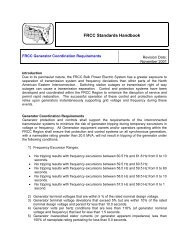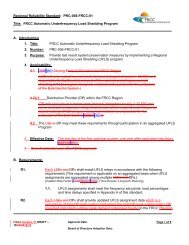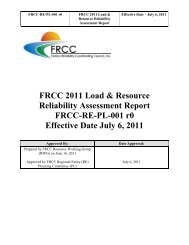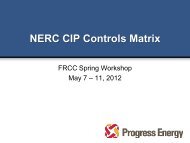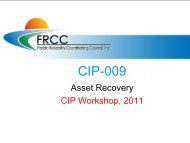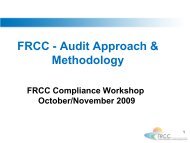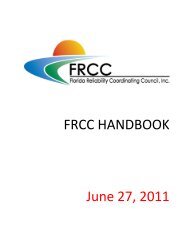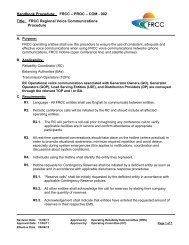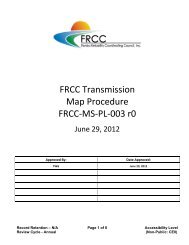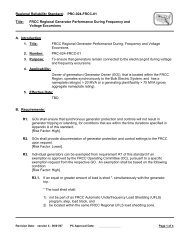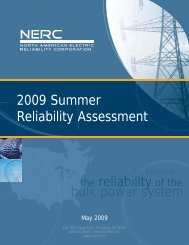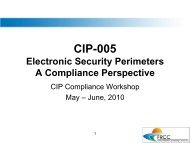2009 Scenario Reliability Assessment - NERC
2009 Scenario Reliability Assessment - NERC
2009 Scenario Reliability Assessment - NERC
- No tags were found...
Create successful ePaper yourself
Turn your PDF publications into a flip-book with our unique Google optimized e-Paper software.
<strong>Scenario</strong> <strong>Reliability</strong> Self-<strong>Assessment</strong>sOperational IssuesThe continued increase in wind generation has the potential to lead to increased operatingchallenges, even more so in this <strong>Scenario</strong>. The Renewable Technologies Working Group(RTWG) has been established to coordinate activities related to wind integration in the ERCOTRegion. The RTWG has produced a work plan for study and resolution of all identified windintegration issues and is reporting to the PUCT on a quarterly basis. 32ERCOT ISO has already implemented several operational changes intended to maintain systemreliability with the inclusion of significant wind resources. ERCOT has implemented acentralized wind forecasting system. In addition, ERCOT has updated the ancillary servicemethodology, which is used to determine the procured quantities of ancillary services, to accountfor wind uncertainty. These changes allow ERCOT to adjust the amount of Non-SpinningReserve Service to account for the uncertainty associated with not only load forecasting but windforecasting as well. The ancillary service methodology change also accounts for increases ininstalled wind capacity in the Regulation Service. ERCOT is actively developing both aprobabilistic operational risk assessment program and wind ramp event forecasting system tofurther assess the risk associated with high-wind penetration during the operations planningtimeframe and allow for timely mitigation of the identified risks through the procurement ofappropriate ancillary services. Finally, ERCOT has implemented voltage ride-throughrequirements for new wind generation and is studying the benefits of the application of theserequirements to existing wind generation. All of these processes are needed for Long-Term<strong>Reliability</strong> <strong>Assessment</strong> Reference Case levels of wind generation and would also providemechanisms to maintain reliability in with the <strong>Scenario</strong> Case level of wind generation.The impact of wind generation on ancillary services requirements is a concern for the Region.The level of ancillary services necessary to reliably support approximately 15 GW (relative to a2014 load level) was evaluated in a study performed by General Electric (GE Ancillary ServicesStudy) for ERCOT in 2006 33 . While the additional level of ancillary services necessary tosupport the approximate 25 GW presumed in this <strong>Scenario</strong> was not evaluated, the GE AncillaryServices Study provides valuable insight on ancillary service concerns.The GE Ancillary Services Study (Figure ERCOT-4) also shows that in the high wind, low loadscenario the committed combined cycle capacity is reduced to almost zero in some overnightperiods and the coal fired generation shows some deep turn downs to near minimum output inthe overnight dispatch. As the wind capacity is increased to 24 GW, it can be assumed thisimpact would be increased and it may be necessary to curtail wind output during low loadperiods in order to have sufficient committed generation to serve the following day’s peak, givenexisting generation fleet.32 http://www.ercot.com/content/meetings/tac/keydocs/<strong>2009</strong>/0305/09._ERCOT_Report_to_PUCT_-_March_<strong>2009</strong>_Final_02-26-<strong>2009</strong>.doc andhttp://www.ercot.com/content/meetings/tac/keydocs/<strong>2009</strong>/0305/09._Attachment_A_-_RTWG_Master_Issues_List_Final_02-26-09.xls33 http://www.ercot.com/content/news/presentations/2008/Wind_Generation_Impact_on_Ancillary_Services_-_GE_Study.zip<strong>2009</strong> <strong>Scenario</strong> <strong>Reliability</strong> <strong>Assessment</strong> Page 27



